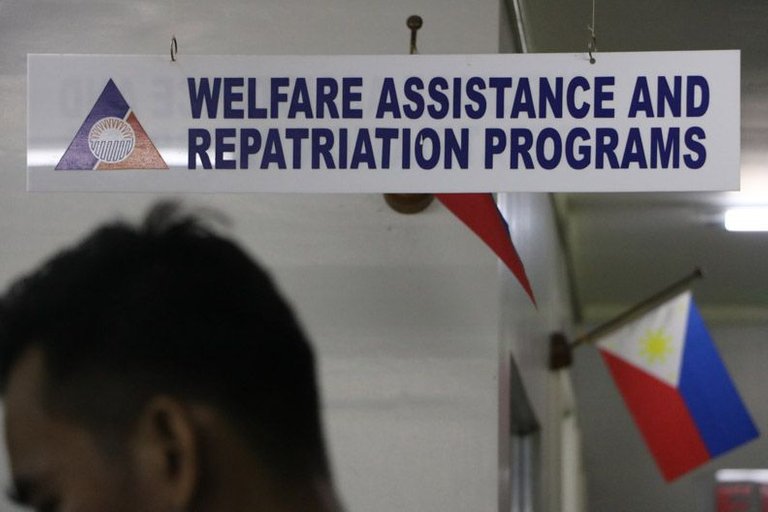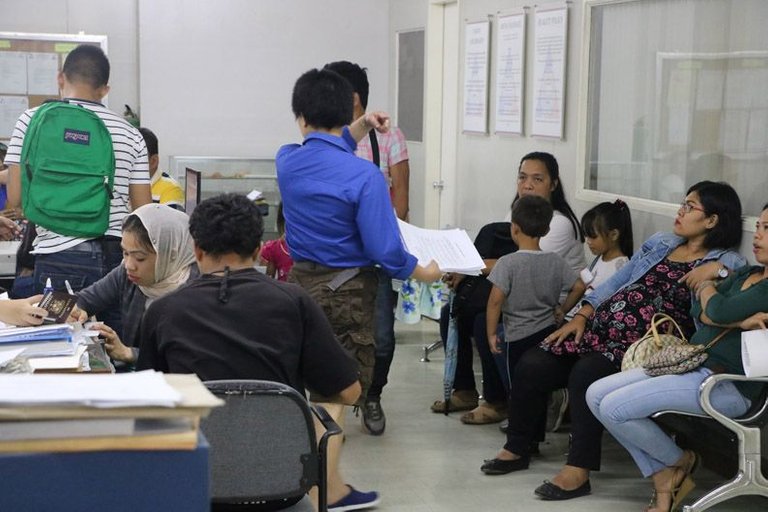 Overseas Workers Welfare Administration's (OWWA) office has been receiving increasing welfare complaint and cases from workers in Kuwait
Overseas Workers Welfare Administration's (OWWA) office has been receiving increasing welfare complaint and cases from workers in KuwaitPhilippine President Rodrigo Roa Duterte declared a total deployment ban of new workers on Kuwait due to the increasing abuse of employers and recruitment agencies. The Philippine is one of the largest producer of household service workers/maids in the middle east and one of the most recommended workers in terms of skills, work ethics and knowledge. Out of 225,000 total Filipino workers in Kuwait most of them are maids. The ban was implemented right after a Filipina maid was found dead in a freezer weeks ago. Signs of abuse was present and the worker was left frozen for a year.

Overseas workers waiting in line to pay processing fees and waiting for livelihood assistance in OWWA
WHY KUWAIT AND REASONS FOR WORKING IN KUWAIT?
One of the many reasons why Filipinos aspire work in another country is due to poverty. Recruitment agencies work hard to convince hopefuls who dream of green pastures. It is easy to land a job in Kuwait because of the urgency and employers provide advance payment for the passport, processing fees and plane tickets. All the worker has to do is show up and attend trainings prior to departure. This has been deemed attractive for people who are in dire need to help her own family and their needs without much hassle at all.
Others also want to escape the mundane life and want to explore outside the country. Some want to escape problems and see possibilities of earning and living life in another environment.
MIGRATION REALITIES KICK IN
Workers have a sudden culture shock even though they were given orientations on the life and culture in the middle east. They discover that life in the Philippines is very different in the middle east. They also do not expect the bulk of work given to them by their employers. Food is the common complaint in which they are not used to. Religious laws should be strictly followed which is something difficult and new for a worker to adjust into especially for one who comes from a democratic country.
COMMON ABUSES EXPERIENCED BY FILIPINO MAIDS IN KUWAIT
1. Overworked
Work is not your regular 8 -10 hours per day. In fact it is more than the usual average working hours. Usually they wake up at 3:00 am and end work near midnight. A worker may be expected to cater to extended families as well. One worker recounted that she has to travel to another house to attend to the needs of the elders and the second wife, which is quite impossible to fit in a day.
2. Rape and Sexual Harassment
Many have reported that they have been raped, groped, and was subjected to sexual acts by their male employers.
3. Physical abuse

A Filipina domestic worker came home in crutches because her employer pushed her from the 4th floor of the house.
Due to the language barrier and cultural differences, employers have a hard time communicating with their employees thus some will resort to physical abuse. A worker will be locked up, slapped, beaten up or be deprived of food by the madame if she is dissatisfied with the worker.
The workers still have a hard time reporting or communicating abuses because employers confiscate their passports, mobile phones and cancel their resident visa. If their resident visa is cancelled, chances are they are reported and arrested by the government for illegally staying in the country. If by chance the worker can immediately transfer to another employer and shoulder the transfer expenses well and good, but if not, they have to wait to be rescued by their own government and make the deal for them to come home which could take a while until the case is settled because of the expenses incurred to employ the worker and by the bounds of the employment contract.
Some workers have the option to escape to another country in hopes to find an employer but it would impose difficulty for the government and recruitment agency to locate them in case of distress and danger.
Suicide rate is also increasing due to the widespread abuse. Mental illness is also prevalent, the shock and maltreatment experienced by the worker have made reports rise more than the usual.

A distressed Filipina worker asking for help to be rescued from the employer due to stressful working conditions
Kuwait has the most number of abuses in the middle east when it comes to domestic workers. Although not all Filipina household workers experienced maltreatment from their Kuwaiti employers, some even experienced pleasant and strong bond with their employers, it is still apparent that stricter labor laws and rights should be implemented by the government.
Still local recruitment agencies are also to blame for they are knowledgeable of the employer practices and abuses to workers. Businesses who cater to these employers are given enticing commissions for them continue and provide new workers despite of the constant job turn-overs and complaints. Contract provisions are not usually followed and there is an unavoidable pressure to settle and compromise once the worker is already in distress and eager to come home.
This week, our office, OWWA has received seven (7) welfare cases of workers in our region alone. There are cases in other regions as well.
I am relieved that the government is finally taking action and is now proactive in handling the problems of our workers. They should be valued and treated fairly and according to the agreed contract provisions. The ban has made my countrymen aware and practice vigilance to protect our fellow Filipinos.
I don’t know why most people in kuwait really abuse filipinos, good thing they did sometnig already. Good post @shellany to inform everyone how cruel they are.
Culture still has a big factor. We hope the Kuwaiti government would take action and impose strict laws on labor practices there. Thanks for taking the time to read my post! ☺
That really sicks that so many had and are having a bad experience in Kuwait. If the recruitment agencies are based in PH than the local government should hold them accountable for putting Filipinas in dangerous situations knowingly.
Sadly corruption is still prevalent between the agency that approves these agencies and mediating parties in the embassies and consulates particularly in the middle east. Thanks for reading! ☺